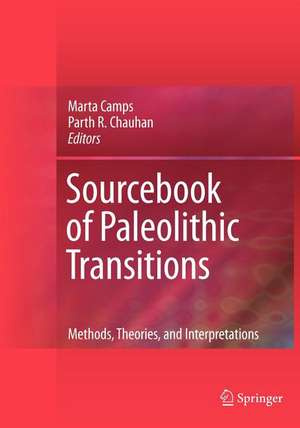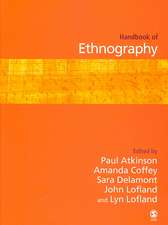Sourcebook of Paleolithic Transitions: Methods, Theories, and Interpretations
Editat de Marta Camps, Parth Chauhanen Limba Engleză Paperback – 23 aug 2011
| Toate formatele și edițiile | Preț | Express |
|---|---|---|
| Paperback (1) | 413.92 lei 6-8 săpt. | |
| Springer – 23 aug 2011 | 413.92 lei 6-8 săpt. | |
| Hardback (1) | 618.52 lei 38-44 zile | |
| Springer – 24 sep 2009 | 618.52 lei 38-44 zile |
Preț: 413.92 lei
Nou
Puncte Express: 621
Preț estimativ în valută:
79.20€ • 82.90$ • 65.92£
79.20€ • 82.90$ • 65.92£
Carte tipărită la comandă
Livrare economică 31 martie-14 aprilie
Preluare comenzi: 021 569.72.76
Specificații
ISBN-13: 9781461413691
ISBN-10: 1461413699
Pagini: 574
Ilustrații: XXVI, 574 p.
Dimensiuni: 193 x 260 x 31 mm
Greutate: 1.03 kg
Ediția:2009
Editura: Springer
Colecția Springer
Locul publicării:New York, NY, United States
ISBN-10: 1461413699
Pagini: 574
Ilustrații: XXVI, 574 p.
Dimensiuni: 193 x 260 x 31 mm
Greutate: 1.03 kg
Ediția:2009
Editura: Springer
Colecția Springer
Locul publicării:New York, NY, United States
Public țintă
GraduateCuprins
Methodological and Theoretical Perspectives.- Has the Notion of “Transitions” in Paleolithic Prehistory Outlived Its Usefulness? The European Record in Wider Context.- Accidents of History: Conceptual Frameworks in Paleoarchaeology.- Defining Modernity, Establishing Rubicons, Imagining the Other—and the Neanderthal Enigma.- The Longest Transition or Multiple Revolutions?.- Quantifying Transitions: Morphometric Approaches to Palaeolithic Variability and Technological Change.- ESR Dating at Hominid and Archaeological Sites During the Pleistocene.- The South Asian Paleolithic Record and Its Potential for Transitions Studies.- DISCUSSION 1: An Overview of Matters Transitional, From the Outside Looking In.- Changes Within the Lower Paleolithic.- From Nothing to Something: The Appearance and Context of the Earliest Archaeological Record.- The Oldowan-Acheulian Transition: Is there a “Developed Oldowan” Artifact Tradition?.- Lower Palaeolithic Transitions in the Northern Latitudes of Eurasia.- Hominin Adaptability and Patterns of Faunal Turnover in the Early to Middle Pleistocene Transition in the Levant.- DISCUSSION 2: Transitions: Behavioral Change in the Early Pleistocene.- Lower to Middle Paleolithic Transitions.- Assessing the Lower to Middle Paleolithic Transition.- The East Asian Middle Paleolithic Reexamined.- The Lower to Middle Paleolithic Transition in South Asia and Its Implications for Hominin Cognition and Dispersals.- DISCUSSION 3: The Lower to Middle Paleolithic Transition.- Middle to Upper Palaeolithic Transitions.- The Middle-Upper Paleolithic Transition Revisited.- Historical Perspectives on the European Transition from Middle to Upper Paleolithic.- From the Middle to the Later Stone Age in Eastern Africa.- Comparing Middle to Upper Paleolithic Transitions in the Middle East and Egypt.- Through the Looking-Glass. The Most Recent Years of Cantabrian Research in the Middle to Upper Palaeolithic Transition.- The Transitional Aurignacian and the Middle-UpperPalaeolithic Transition Model in Cantabrian Iberia.- Hard Work Never Goes to Waste: The Role of Iberia in the Mid-Upper Paleolithic Transition.- What Is a ‘Transitional’ Industry? The Uluzzian of Southern Italy as a Case Study.- Middle/Upper Paleolithic Interface in Vindija Cave (Croatia): New Results and Interpretations.- Szeletian, Not Aurignacian: A Review of the Chronology and Cultural Associations of the Vindija G1 Neandertals.- The Bükk Mountain Szeletian: Old and New Views on “Transitional” Material from the Eponymous Site of the Szeletian.- The Subsistence Behaviours of the Last Crimean Neanderthals.- DISCUSSION 4: The Middle-to-Upper Paleolithic Transition: What News?.- The Later Paleolithic.- Investigating the Aurignacian/Gravettian Transition in the Bistri?a Valley (NE-Romania).- Modern Human Colonization of the Siberian Mammoth Steppe: A View from South-Central Siberia.- Shades of Gray: The Paleoindian–Early Archaic “Transition” in the Northeast.- Central Andean Lithic Techno-Typology at the Terminal Pleistocene-Early Holocene Transition.- The Paleolithic-Mesolithic Transition.- DISCUSSION 5: Transitions in the Later Palaeolithic.
Notă biografică
Parth R. Chauhan is an Indian-American Research Associate with the Stone Age Institute (Indiana, USA). He obtained his PhD from the University of Sheffield (UK) in 2005 and his MA from Deccan College Postgraduate Research Institute (Pune, India) in 1998. His research interests include Old World prehistory, Palaeolithic archaeology, hominin dispersals, Asian paleoanthropology, vertebrate paleontology and taphonomy and lithic technology. He is currently carrying out research on early human technological and environmental adaptations during the Quaternary of India and Yemen.
Textul de pe ultima copertă
Sourcebook of Paleolithic Transitions
Edited by:
Marta Camps, George Washington University, Washington, DC, USA
Parth R. Chauhan, CRAFT Stone Age Institute, Indiana University, Gosport, IN, USA
This sourcebook addresses the different transitional processes by examinating the nature and extent of behavioural changes, cultural patterns and differences that have been attributed to them. It brings together a global body of research and compares differing theoretical perspectives on the transitions - not only to compare and discuss results from the various areas, but also to evaluate the contrasts between the different archaeological traditions. The top researchers in both regional field research and theoretical aspects of this key event in human prehistory have contributed to build a seminal book from both an anthropological as well as theoretical viewpoint.
Sourcebook of Paleolithic Transitions will not only summarise past work, but will also assess current research strategies and the latest results - as well as discuss guidelines for the future. It will contribute to Paleolithic research, by providing the scientific community with an up-to-date publication which:
Edited by:
Marta Camps, George Washington University, Washington, DC, USA
Parth R. Chauhan, CRAFT Stone Age Institute, Indiana University, Gosport, IN, USA
This sourcebook addresses the different transitional processes by examinating the nature and extent of behavioural changes, cultural patterns and differences that have been attributed to them. It brings together a global body of research and compares differing theoretical perspectives on the transitions - not only to compare and discuss results from the various areas, but also to evaluate the contrasts between the different archaeological traditions. The top researchers in both regional field research and theoretical aspects of this key event in human prehistory have contributed to build a seminal book from both an anthropological as well as theoretical viewpoint.
Sourcebook of Paleolithic Transitions will not only summarise past work, but will also assess current research strategies and the latest results - as well as discuss guidelines for the future. It will contribute to Paleolithic research, by providing the scientific community with an up-to-date publication which:
- encompasses instrumental classic views, crucial to understanding how these phenomena have been studied
- includes current research and the newest developments, which have only been partially presented in specialised journals
- incorporates a joint and debated look to the future of this research, highlighting the outcome of the balance of many years of studies, and the most promising research leads for the coming years.
Caracteristici
Brings together an international group of leading researchers to discuss past, present and future research on the Paleolithic transitions Approaches the topic from a anthropological and theoretical perspective The cases are from around the world, making this a truly international sourcebook Includes supplementary material: sn.pub/extras












